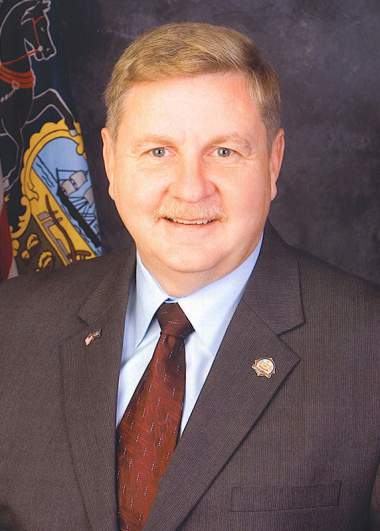
The special election for the vacant Pennsylvania 18th congressional district will be held Tuesday, March 13. Recent polls show that the race between Republican Rick Saccone and Democrat Conor Lamb will likely be tight.
Saccone and Lamb are vying to replace Republican Rep. Tim Murphy, who resigned on October 21, 2017, after it was revealed that he encouraged a woman he was having an affair with to have an abortion, according to the Pittsburgh Post-Gazette. The district is located in Western Pennsylvania and includes parts of Allegheny, Greene, Washington and Westmoreland counties.
The last three polls show both Lamb and Saccone near or within the margin of error. A victory for Lamb would be an upset. President Donald Trump defeated Hillary Clinton by 20 points in the 2016 election. Murphy ran uncontested in 2016 and 2014 and defeated his Democratic challenger by a 64 to 36 margin in 2012.
The race has drawn national attention. Former Vice President Joe Biden came to the district last Tuesday to campaign for Lamb, while Trump held a rally on Saturday for Saccone. Lamb has outraised Saccone by a 5 to 1 margin, pulling in $3.3 million in contributions to Saccone’s $703,000, but outside groups have spent $9.1 million to boost Saccone’s candidacy, compared to $1.1 million in outside spending for Lamb, according to Politico.
The Cook Political Report recently moved the race to a “toss up,” according to PA Politics.
“What’s made the race so close, many Republicans admit, is that Lamb has simply proven to be a stronger candidate than Saccone,” the report says.
Here are the most recent poll numbers:
Monmouth: Lamb Leads in 3 Different Turnout Models
Lamb leads 51 to 45, with 3 percent undecided and 1 percent voting for third party candidates, “if turnout yields a Democratic surge similar to voting patterns seen in other special elections over the past year,” Monmouth finds.
“Using a historical midterm lower turnout model,” Lamb holds a 49 to 47 lead, according to Monmouth. If there is a higher turnout, such as in a presidential election year, Lamb is ahead 51 to 44, according to Monmouth.
A poll by Monmouth last month showed Saccone ahead in all three circumstances. He had a 49 to 46 lead in a surge model, 48 to 44 in a higher turnout model and 50 to 45 in low turnout. The university’s polling institute explains:
The multiple turnout models used in this poll are similar to Monmouth’s polling for December’s special U.S. Senate election in Alabama. The key difference between the Democratic ‘surge’ model and the standard low turnout model in PA18 is an increase in the districtwide vote share coming from historically Democratic-leaning and competitive precincts. Most of these precincts are located in Allegheny County with some in neighboring Washington County. These precincts typically make up about 19 percent of PA18’s electorate in any given election. The surge adjustment increases that share to 21 percent.
“This district has voted overwhelmingly Republican in recent elections, but a large number of these voters have blue-collar Democratic roots. Lamb seems to have connected with them,” Patrick Murray, director of the independent Monmouth University Polling Institute.
Lamb holds a net positive 53 percent favorable and 33 percent unfavorable rating, while Saccone is at 47 percent favorable and 43 percent unfavorable.
The new Monmouth poll also found that just 3 percent of likely voters were moved toward supporting Saccone because of Trump’s decision to impose tariffs on foreign steel, while 1 percent said they moved toward voting for Lamb. The poll found 96 percent of voters do not think the tariff announcement will have an impact on the race, while 43 percent say the tariffs will help the local area’s economy and 36 percent believe it will hurt it. Another 8 percent said they think the tariffs will have no impact, while 13 percent are not sure.
“Voters are divided on the potential impact of tariffs. It doesn’t seem that the president’s gambit paid off in this race if that was his intent. But the poll was largely conducted before Trump’s rally Saturday night and we don’t have a clear picture of what impact that might hold. A Saccone victory is still well within the poll’s margin of error, especially if a Democratic surge does not materialize in the Pittsburgh suburbs,” said Murray, who is in charge of the university’s polling institute.

GettyConor Lamb leads Rick Saccone in the latest Monmouth Poll, released the day before the special election in Pennsylvania’s 18th congressional district.
Voters in PA18 are divided on Trump’s job performance, with a 49 percent approving and49 percent disapproving, which is down from last month, when 51 percent approved and 7 percent disapproved of his performance.
“Voters who approve of Trump are somewhat more likely to support the Democrat Lamb (7 percent to 90 percent for Saccone) than voters who disapprove of Trump are to support the Republican Saccone (2 percent to 96 percent for Lamb),” the Monmouth press release said.
Murray said, “When added to a potential Democratic surge that has been building for weeks, Lamb appears to have picked off enough Republican-leaning voters to take a lead going into this contest’s final weekend. It would mark an extraordinary swing from Trump’s nearly 20 point victory here in 2016 if he could hold on to win.”
The poll of 503 registered voters was conducted March 8 to 11. It has a margin of error of +/- 5.3 percent.
RABA Research: Lamb +4 (March 6-8)
RABA Research conducted a poll of 707 likely voters between March 6 to March 8 in Pennsylvania’s 18th congressional district.
According to its website, RABA, which stands for “Red America, Blue America,” was founded in 2016, and is a “bipartisan group of political professionals who have worked for candidates, issues, organizations, and corporations across the globe.”
The poll group found 48 percent of respondents would vote for Lamb, 44 percent would vote for Saccone and 9 percent are not sure whom they would vote for. The poll has a margin of error of +/- 3.7 percentage points.
The same poll found that 44 percent of respondents approve of Trump’s performance, 48 percent disapprove and 9 percent are not sure.
Talking Points Memo first reported on the poll and noted that of the respondents polled, 41 percent said they were Democrats, while 40 percent said they were Republicans in what is a solidly Republican district.
“That could be a sign that the survey’s sample is a touch too Democratic, and that its likely voter screen might be a bit too tight. But it could also be capturing the very real signs of a Democratic wave — a huge disparity in voter enthusiasm from one party to the other,” TPM wrote.
Gravis: Saccone +3 (March 1-5)
A Gravis Marketing poll of 911 registered voters was conducted between March 1 to March 5. It found Saccone with a 3-point lead over Lamb. The poll found 45 percent of respondents would vote for Saccone and 42 percent for Lamb, with a margin of error of +/- 3.3 percent. Thirteen percent of likely voters remain undecided.
According to Gravis, a previous poll conducted in February found Saccone with a 46 percent to 40 percent lead, while a January poll had Saccone up 46 percent to 34 percent.
“Saccone is currently pulling 4% of Clinton voters while Lamb is taking 13.1% of Trump voters. Saccone, however, takes 16% of Democrat compared to Lamb’s 12.3% of Republicans. Lamb holds a 46%-27% lead over independent voters,” according to Gravis.
Emerson: Lamb +3 (March 1-3)
An Emerson College ePoll conducted between March 1 to March 3 found Lamb with a 3-point lead. Of the 474 likely voters polled, 48 percent said they would vote for Lamb, while 45 percent said they would vote for Saccone, leaving 7 percent of those voters undecided. The poll had a margin of error of +/- 4.78 points.
According to Emerson:
This election has garnered a lot of voting excitement with 56% saying they are very excited to
vote, and 7 percent not excited at all. It’s voter excitement that might put Lamb over the top. When asked about level of excitement among voters about the election, 63 percent of Lamb voters reported being very excited compared to 53 percent of Saccone voters. Lamb voters also are paying more attention to the race, with 47 percent reported paying a lot of attention, compared to 42 percent of Saccone voters.Lamb has a positive image in the district, with 48 percent saying they have a favorable opinion and a 33 percent unfavorable rating – 15 percent of voters had heard of him but had no opinion. Saccone is not as popular with a 44 percent favorable and a 40 percent unfavorable rating – 15 percent of voters had heard of him but had no opinion.
Saccone, a 59-year-old Air Force veteran, has been a member of the House of Representatives in Pennsylvania since 2011.
“I was Trump before Trump was Trump,” Saccone told WESA radio in November. “I ran on that agenda in 2010. It’s the same agenda — it’s the people’s agenda. The president just nationalized it.”
Saccone told Real Clear Politics, “This is Trump country. I think he may be more popular now than he was when was elected. … People are calling and want to come see the president. They love him.”

Pennsylvania Republican Rick Saccone.
Lamb, a 33-year-old lawyer, is a first time candidate. He was an assistant U.S. Attorney and a Marine captain, and comes from a prominent political family, according to NBC News.
He has had to work against Republican efforts to connect him to national Democrats, especially House Minority Leader Nancy Pelosi.
“The people running in this race are me and Rick Saccone,” Lamb told the Washington Post. “I’ve been clear where I stand on the need for new leadership. He has not, except to say that he supports Paul Ryan, who supports coming after Social Security and Medicare. I think he’ll have a lot of explaining to do about that.”
Republicans have tried to set themselves to recover from a possible defeat, saying that they did not have a perfect candidate and by saying Lamb is not a typical Democrat. National Republicans are already putting out a message that a Lamb win would not be the sign of a blue wave in November during the midterm elections.
“Democrats fielded a candidate who’s willing to run as a watered-down version of a typical Republican,” an unnamed GOP operative told NPR.
“Lamb is a candidate who has a background, really, out of central casting — military service, prosecutor, young, energetic,” said Mike DeVanney, a Pittsburgh-based GOP consultant, told NPR.

GettyDemocrat Conor Lamb.
Democratic strategist Mike Mikus, of Pittsburgh, told The Associated Press that Lamb would need to “run a perfect campaign” to win the seat, but said it can be done. Mikus told the AP that the number of registered Democrats in the district is representative of the labor’s influence in the area, but Mikus told the AP many of those union house “many of those union households embraced Trump’s populist, protectionist message in 2016,” and “noted they’re also culturally conservative.” Lamb has said he hopes to crack into those union voters, who supported Murphy, because Saccone has supported right to work measures.
Mukis told NPR, “One thing Conor Lamb has done is appeal to moderate voters while maintaining enthusiasm among the Democratic base.”
